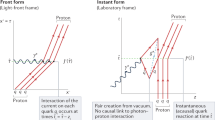Abstract
THE study of pathology, not to mention heredity, has long been leading into the inconceivably small: now astronomers with their giant telescopes are leading us towards the infinitely great. The analysis of the statistics of the spiral nebulæ, remotest of things that we know, has recently been leading the Harvard astronomers (H. Shapley in Proc. U.S. Nat. Acad.) to conclusions that invite inferences. It appears that these objects, more numerous perhaps than all the visible stars, are distributed not uniformly, but rather as including humps or patches, and with complete extinction along our own Milky Way where alone the haze would absorb their light.
This is a preview of subscription content, access via your institution
Access options
Subscribe to this journal
Receive 51 print issues and online access
$199.00 per year
only $3.90 per issue
Buy this article
- Purchase on Springer Link
- Instant access to full article PDF
Prices may be subject to local taxes which are calculated during checkout
Similar content being viewed by others
Author information
Authors and Affiliations
Rights and permissions
About this article
Cite this article
LARMOR, J. Relativity in the Remotest Heavens. Nature 147, 175–176 (1941). https://doi.org/10.1038/147175a0
Issue Date:
DOI: https://doi.org/10.1038/147175a0
This article is cited by
Comments
By submitting a comment you agree to abide by our Terms and Community Guidelines. If you find something abusive or that does not comply with our terms or guidelines please flag it as inappropriate.


